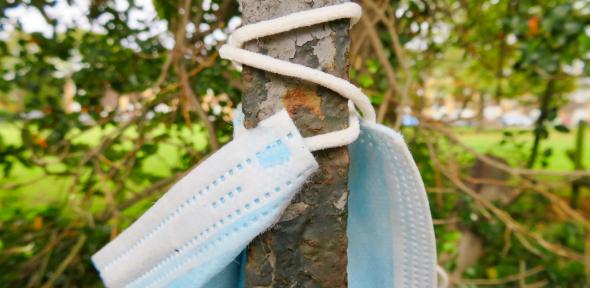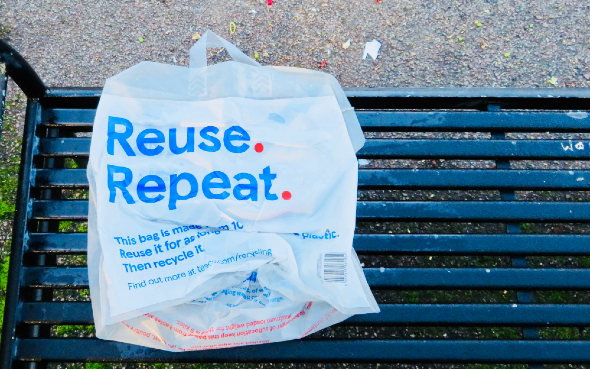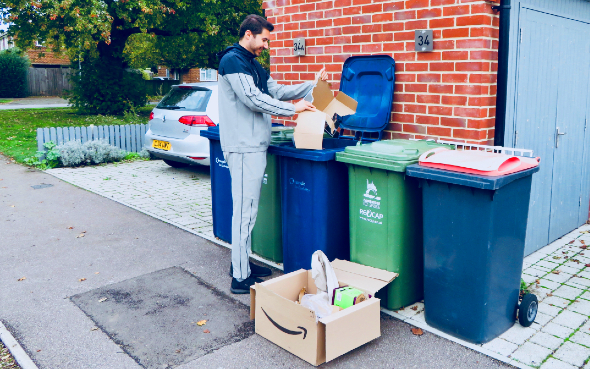
Mask, gloves and takeaway packaging rises
With plastics having fallen out of the headlines, Stephen Jardine raises the issue of single use plastic on his BBC Radio Scotland morning show. Prompted by the Scottish government’s request for the public’s input into a ban, Patrick O’Hare was interviewed about his research. The following is a paraphrased summary of the conversation. O’Hare argues for a balanced approach to making sure that re-use stays on the agenda, while protecting ourselves from Covid-19 and restricting single use plastic items.
Stephen Jardine: What got you interested in single use plastic?
Patrick O'Hare: My research is more broadly focused on recycling, re-use and recovery from waste. Most of my work has been in Montevideo, the capital of Uruguay. Initially it was the sight of people using a horse and cart to collect and re-use waste that caught my attention. In 2014, I worked with waste pickers at a landfill in Montevideo. Since then, I have moved onto plastics.

O’Hare (right) participating in a local festival as part of his recent research in Montevideo, Uruguay
Stephen Jardine: We never think about what happens to our rubbish. We use things and then they are gone. You must have seen some sights?
Patrick O'Hare: Working at a landfill means you get to see how much waste is produced and what 2000 tons of waste looks like. Waste pickers rely on a steady stream of material to sort and sell. But it is sometimes difficult to identify what sort of plastic items are made from. One option is to ban some items. But it is also important to concentrate production on plastics that have a ‘clear chain of recovery and reproduction.’ This would ensure the majority of plastic items get recycled or re-used.

A plastic bag repurposed as a seat cover in Cambridge. O’Hare’s research looks at how plastics are re-used to reduce waste
Stephen Jardine: Canada is banning most single use plastic items by 2021. What can we learn from the approach that is taken in Uruguay?
Patrick O'Hare: It’s important to value the work that waste pickers do. People in the UK might see people working at a landfill sites as not particularly dignified. But these people are recovering a huge amount of plastic. Their work is often not recognised but they should be described as recycling heroes. Compared to Uruguay, the UK has less people employed and provides a municipal collection service. But in both countries classification is important. Whether you are a waste picker or a resident, if items are easy to classify into recyclable or non-recyclable, it makes sorting items a lot quicker.

When waste pickers classify waste as it arrives at landfills in Uruguay, they are doing the same work as UK residents but on a much larger scale.
Stephen Jardine: Are you worried that the impact of single use plastic on the environment has slipped down the agenda since the Covid-19 outbreak?
Patrick O'Hare: It’s understandable that Covid-19 has taken centre stage. At the beginning of the pandemic there was a lot of misinformation and confusion about reusing plastic. Some people thought that reuse was dangerous or unhygienic. This idea was reinforced by the plastics industry. But since then, scientific evidence has been published that counters this. As long as you put the correct hygiene procedures in place, and materials are disinfected, items such as cups can be re-used safely. Some groups launched ‘contactless coffee’ so that re-usable cups can be used without the barista touching it.
In response to the question ‘Is it safe to use a reusable coffee cup or water bottle?’ the Mayor of London posted the video on contactless coffee, as advocated by the London Scientific and Advisory Cell (STAC). See full briefing note here.
Still interested?
Titled ‘Tackling Scotland’s Throwaway Culture’ the Scottish government’s plans are open for public comment until January 2021. Read the full proposal here or access the Scottish government’s consultation on plastic here.
You can read more about Patrick O’Hare’s work with waste pickers in Uruguay here.

